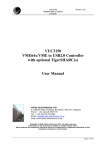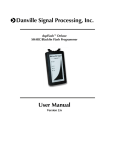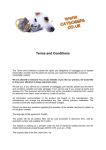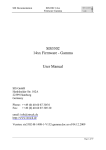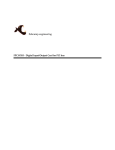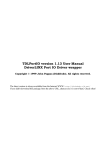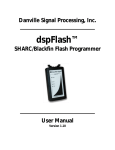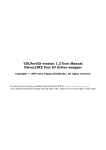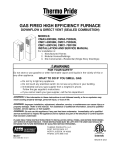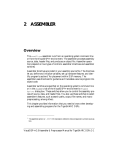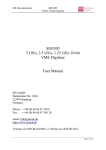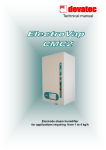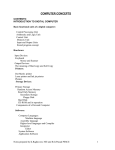Download SIS3150USB USB2.0 to VME Interface with optional TigerSHARC(s
Transcript
SIS Documentation SIS3150USB USB2.0 to VME interface SIS3150USB USB2.0 to VME Interface with optional TigerSHARC(s) User Manual SIS GmbH Harksheider Str. 102A 22399 Hamburg Germany Phone: ++49 (0) 40 60 87 305 0 Fax: ++49 (0) 40 60 87 305 20 email: [email protected] http://www.struck.de Version: sis3150usb-M-0-1v130 as of 02.10.08 Page 1 of 73 SIS Documentation SIS3150USB USB2.0 to VME interface Revision Table: Revision 0.01 1.00 1.01 1.10 1.10a 1.20 1.21 1.22 1.23 1.24 Date 25.12.04 14.01.01 09.02.05 10.03.05 10.05.05 02.06.05 26.10.05 19.12.05 26.12.05 26.09.06 1.25 1.26 1.27 1.28 1.29 1.30 28.03.07 24.05.07 06.12.07 22.01.08 28.03.08 02.10.08 Page 2 of 73 Modification Generation First official release S80, 610 and 620 added Block diagram, USB resource access, VME addressing Minor corrections Firmware rev. 0x2004, VME side LEMO out select register lsusb screen shot with 3150 db entry 1st TS as option also closedriver VI, touch up Bug fix in BERR timeout table (default 1,25 s) Retry Error added LED table added Power consumption added Bug Fix in Arbiter Behaviour, LWORD note S80-6 and 7 explanation Note on D16 VME access from TigerSHARC Additional VIs (require DLL version 20.01.08 or later) SIS Documentation SIS3150USB USB2.0 to VME interface 1 Table of contents 1 1 2 Table of contents..............................................................................................................3 Introduction .....................................................................................................................5 Functionality....................................................................................................................6 2.1 3 4 Applications ...................................................................................................................................... 6 Block Diagram.................................................................................................................7 USB device ......................................................................................................................8 4.1 SIS3150 USB Register space ............................................................................................................. 8 4.1.1 USB Register Space Address Map.............................................................................................. 9 4.2 USB Register description................................................................................................................. 10 4.2.1 USB Control/Status Register(write/read) .................................................................................. 10 4.2.2 Module Id. and Firmware Revision Register ( read) .................................................................. 11 4.2.3 USB TS-Link Connect Register(write**/read) .......................................................................... 12 4.2.4 USB LEMO Out Select Register (write**/read)........................................................................ 13 4.2.5 USB VME Master Status/Control register (read/write).............................................................. 14 4.2.6 USB VME Master Cycle Status (read)..................................................................................... 16 4.2.7 USB VME Interrupt Status Register (read) ............................................................................... 16 4.2.8 XILINX JTAG_TEST register.................................................................................................. 17 4.2.9 XILINX JTAG_DATA_IN register .......................................................................................... 17 4.2.10 XILINX JTAG_CONTROL register......................................................................................... 17 4.3 TS-BUS (internal TigerSHARC Bus)............................................................................................... 18 4.4 VME Bus ........................................................................................................................................ 18 5 VME Slave ....................................................................................................................20 5.1 VME Slave Addressing.................................................................................................................... 20 5.1.1 VME Slave Address map of SIS3150 ....................................................................................... 21 5.2 Register description ......................................................................................................................... 23 5.2.1 Control/Status Register(0x, write/read)..................................................................................... 23 5.2.2 Module Id. and Firmware Revision Register (0x4, read)............................................................ 24 5.2.3 Interrupt configuration register (0x8)........................................................................................ 25 5.2.4 IRQ mode ................................................................................................................................ 25 5.2.5 Interrupt Control/Status register (0xC)...................................................................................... 26 5.2.6 LEMO Out Select Register (write/read) .................................................................................... 28 5.2.7 XILINX JTAG_TEST register.................................................................................................. 29 5.2.8 XILINX JTAG_DATA_IN register .......................................................................................... 29 5.2.9 XILINX JTAG_CONTROL register......................................................................................... 29 5.3 Common Bus description................................................................................................................. 30 5.3.1 CMC Site................................................................................................................................. 30 5.3.2 TigerSHARC ........................................................................................................................... 30 5.3.3 SDRAM................................................................................................................................... 30 6 TigerSHARC .................................................................................................................31 6.1 6.2 6.3 7 TigerSHARC global Memory Map .................................................................................................. 31 TS Hardware Interrupts.................................................................................................................... 32 TS Links.......................................................................................................................................... 33 TigerSHARC Internal Space Address Translation Table (VME / TigerSHARC) ............34 7.1 7.2 7.3 8 TigerSHARC TS1 Memory Space ................................................................................................... 34 TigerSHARC TS2 Memory Space ................................................................................................... 35 SDRAM Memory Space ................................................................................................................. 35 Tiger SHARC Host Space..............................................................................................36 8.1 9 TigerSHARC VME Master Space.................................................................................................... 36 Windows Driver.............................................................................................................39 9.1 Installation....................................................................................................................................... 39 9.1.1 Setup Installation Scripts.......................................................................................................... 39 9.1.2 Installation under XP................................................................................................................ 39 9.2 SIS3150USB base program.............................................................................................................. 42 10 10.1 Labview (Windows) Interface .....................................................................................43 closedriver....................................................................................................................................... 44 Page 3 of 73 SIS Documentation 10.2 10.3 10.4 10.5 10.6 10.7 10.8 10.9 10.10 10.11 10.12 10.13 10.14 10.15 10.16 10.17 10.18 11 lsusb................................................................................................................................................ 53 VME Readout Speed...................................................................................................54 12.1 13 Performance/speed test .................................................................................................................... 54 Front Panel Elements ..................................................................................................55 13.1 13.2 14 Front Panel LEDs ............................................................................................................................ 55 USB1/USB2.0 Distinction ............................................................................................................... 56 Jumpers/connectors.....................................................................................................57 14.1 14.2 14.3 14.4 14.5 14.6 14.7 14.8 14.9 14.10 15 16 17 FindAll_SIS3150USB_Devices ....................................................................................................... 44 handle.gbl........................................................................................................................................ 44 sis3150usb_load_dsp sis3150 usb_load_dsp_fileprompt ................................................................... 45 sis3150usb_version.......................................................................................................................... 45 sis3150usb_register_dma_write ....................................................................................................... 46 sis3150usb_register_dma_read......................................................................................................... 46 sis3150usb_register_sgl_write ......................................................................................................... 47 sis3150usb_register_sgl_read........................................................................................................... 47 sis3150_tsbus_dma_write ............................................................................................................ 48 sis3150_tsbus_dma_read.............................................................................................................. 48 sis3150_tsbus_sgl_write............................................................................................................... 49 sis3150_tsbus_sgl_read................................................................................................................ 49 vme_read..................................................................................................................................... 50 vme_write.................................................................................................................................... 50 vme_a32d32_read........................................................................................................................ 51 vme_a32d32_write....................................................................................................................... 51 vme_dma_read ............................................................................................................................ 52 LINUX .......................................................................................................................53 11.1 12 SIS3150USB USB2.0 to VME interface J10 16 MHz VME Sysclock............................................................................................................. 58 J770 and J771 Termination of LEMO Input 1 and 2 ......................................................................... 58 JP570 SIS3150 FPGA JTAG source................................................................................................. 59 JP580 CMC FPGA JTAG source ..................................................................................................... 59 Jumper JP_CMC1 and JP_CMC2..................................................................................................... 60 CON570 SIS3150 JTAG connector................................................................................................. 61 CON580 CMC JTAG connector ..................................................................................................... 61 TS_JTAG: TigerSHARCs JTAG Test Access Port connector ......................................................... 62 Switch S80 ...................................................................................................................................... 63 Switch S610 and S620 ................................................................................................................. 64 SIS3150 Top Assembly Drawing ................................................................................65 Connector types ..........................................................................................................66 Appendix ....................................................................................................................67 17.1 Power Consumption......................................................................................................................... 67 17.2 Protocol........................................................................................................................................... 67 17.2.1 Transfer Write Access .............................................................................................................. 67 17.2.2 Transfer Read Access............................................................................................................... 68 17.2.3 Block transfer Read Direct VME Bus Access ........................................................................... 70 17.3 Glossary .......................................................................................................................................... 71 18 Index ..........................................................................................................................72 Page 4 of 73 SIS Documentation SIS3150USB USB2.0 to VME interface 1 Introduction The SIS3150/9921 USB2.0 to VME interface is a combination of two cards. The actual VME master/slave card is the SIS3150 dual CMC carrier board, which can be equipped with up to 2 TigerSHARC Digital Signal Processors (DSPs). The SIS9921 is the interfacing CMC card, which has the Cypress Semiconductor CY7C68013 USB2.0 controller chip. While a USB to VME interface is slow for single cycle VME transactions (typically 100 s) compared to a PCI to VME interface (SIS1100/3100 typically 5 s) you can reach block transfer speeds in the 30 MByte/s ballpark (what is similar to many Tundra Universe II based SBC’s). On the SIS3150/9921 single cycle performance can be enhanced in two ways. pipelining of several cycles execution of VME transactions under control of the TigerSHARC DSP Especially with the 2nd approach the USB2.0 to VME interface allows for the implementation of very demanding hard realtime applications in combination with the ease of use with your laptop computer The use of the 2nd CMC site of the SIS3150 for a frontend card like the SIS9300 4 channel 100 MHz 14-bit digitizer board allows you to build efficient systems with and without making use of the VME bus. A 4 channel ADC/digitizer system of that type in a rackmount box is shown below. Page 5 of 73 SIS Documentation SIS3150USB USB2.0 to VME interface 2 Functionality The SIS3150USB interfaces the popular Universal Serial Bus (USB) to the VMEbus. The modules functionality comprises: USB2.0 and USB1.1 compliance VME master A16/A24/A32 D8/D16/D32/BLT32/MBLT64 VME slave A32/D32/BLT32/MBLT64 1 or 2 TS101 TigerSHARC DSP(s) as option 2 digital front panel inputs/2 outputs 64 MB SDRAM memory 1 available CMC site P2 access to lower CMC site 12 front panel LEDs 2.1 Applications The SIS3150 USB2.0 to VME interface is a good choice whenever: a.) single cycle read/write performance is not of top importance b.) good single cycle performance is required, but single cycle transactions can be handled under control of the TigerSHARC DSP(s). Applications comprise but are not limited to: test benches module acceptance testing hard realtime readout systems histogramming systems data destination for other VME masters/existing readout systems Page 6 of 73 SIS Documentation SIS3150USB USB2.0 to VME interface 3 Block Diagram Find below a block diagram of the SIS3150USB to illustrate the data paths. Used for USB FLASHPROM TS VME SDRAM 64MB CMC1/SIS9300 e.g. TS1_LINK3 TSx Control FST FST FST FST TS2_LINK1 FST TS2_LINK2 TS2 Control FST Tiger Sharc 2 TS2_LINK0 TS2_LINK3 TSx Control VME Bus TS1 Control 64-bit data bus FST TS1_LINK2 32-bit address bus FST FST TS1_LINK1 FST Tiger Sharc 1 TS1_LINK0 FPGA FST Control CMC Site 1 VME P2 (A,C) CMC1_LINK1 CMC1_LINK2 CMC1 Control CMC1_LINK3 CMC Site 2 SIS9921USB CMC2_LINK1 CMC2_LINK2 CMC2 Control Control I/O CMC2_LINK3 TSx_L3 TSx_L2 TSx_L1 LEDs TSx_L0 Page 7 of 73 SIS Documentation SIS3150USB USB2.0 to VME interface 4 USB device The SIS3150USB device (USB peripheral) is hotplugging. The SIS3150USB device in combination with the drivers (Win2K/XP, future option LINUX) supports access to following spaces. - SIS3150 USB register space - SIS3150 TS-BUS (internal TigerSHARC Bus) - VME Bus 4.1 SIS3150 USB Register space The driver offers the following calls: int sis3150Usb_Register_Single_Read(HANDLE usbDevice, ULONG addr, ULONG* data) ; int sis3150Usb_Register_Dma_Read(HANDLE usbDevice, ULONG addr, ULONG* dmabufs, ULONG req_nof_data, ULONG* got_nof_data) ; int sis3150Usb_Register_Single_Write(HANDLE usbDevice, ULONG addr, ULONG data) ; int sis3150Usb_Register_Dma_Write(HANDLE usbDevice, ULONG addr, ULONG* dmabufs, ULONG req_nof_data, ULONG* put_nof_data); Page 8 of 73 SIS Documentation SIS3150USB USB2.0 to VME interface 4.1.1 USB Register Space Address Map Offset 0x0 0x1 0x2 0x3 R/W R/W R R/W R/W 0x10 0x11 0x12 R/W USB VME Master Status/Control register R USB VME Master Cycle Status Register R USB VME Interrupt Status Register 0x20 0x21 R/W USB XILINX JTAG_TEST/JTAG_DATA_IN W USB XILINX JTAG_CONTROL 0x40 R/W Test Register (32-bit read/write register) 0x100 0x101 0x102 0x103 KA KA KA KA Key reset all Key CMC1 Hardware Reset pulse (20ms) Key CMC1 Logic-Reset Key TigerSHARCs Reset pulse (2us) 0x110 0x111 KA KA Key TigerSHARCs TS1 IRQ2 Request Key TigerSHARCs TS2 IRQ2 Request 0x10000000 .. 0x1FFFFFF 0x20000000 0xFFFFFFF Function/Register USB Control/Status register Module Id. and firmware revision register USB TS-Link Connect Register USB LEMO Out Select Register R USB Address/Data Test space: Read Data = Read Address R USB Speed Test space: Read Data = Speed Counter The Speed Counter increments every 16ns (62.5 MHz) The shorthand KA stands for key address. Write access with arbitrary data to a key address initiates the specified function Page 9 of 73 SIS Documentation SIS3150USB USB2.0 to VME interface 4.2 USB Register description The function of the individual registers is described in detail in this section. The first line after the subsection header (in Courier font) like: #define SIS3150_CONTROL_STATUS 0x0 refers to the sis3150usb.h header file. 4.2.1 USB Control/Status Register(write/read) #define SIS3150USB_CONTROL_STATUS 0x0 The control register is in charge of the control of some basic properties of the SIS3150 board, like enabling test pulse generators. It is implemented via a selective J/K register, a specific function is enabled by writing a 1 into the set/enable bit, the function is disabled by writing a 1 into the clear/disable bit (which location is 16-bit higher in the register). An undefined toggle status will result from setting both the enable and disable bits for a specific function at the same time. On read access the same register represents the status register. Bit 31 .. .. 24 23 22 21 20 19 18 17 16 15 .. 6 5 4 3 2 1 0 write Function Clear reserved control bit 15 .. .. Clear USB LEMO Out 2 (*) Clear USB LEMO Out 1 (*) Clear USB LEMO Out control bit Clear USB XILINX JTAG Control bit (*) switch off user LED U2 (*) switch off user LED U1 (*) Set reserved control bit 15 .. .. Set USB LEMO Out 2 (***) Set USB LEMO Out 1 (***) Set USB LEMO Out control bit Set USB XILINX JTAG Control bit switch on user LED U2 (**) switch on user LED U1 (**) read Function 0 .. .. 0 Status LEMO In 2 Latch Status LEMO In 1 Latch Status LEMO In 2 Status LEMO In 1 0 CMC reset pulse active (21ms) 0 CMC1 detect Status reserved control bit 15 .. .. Status USB LEMO Out 2 Bit Status USB LEMO Out 1 Bit Status USB LEMO Out control bit Status USB XILINX JTAG Control bit Status User LED U2 (**) Status User LED U1 (**) (1=LED on, 0=LED off) (*) denotes power up default setting, i.e. the power up reading of the register is 0x0 (**) the LEDs could be also set from VME Slave side (***) see USB LEMO Out Select Register LEMO In 1/2 Latch is set on the leading edge of LEMO In 1/2 (> 16ns) and is cleared on read access (if it was set). USB LEMO Out Control bit = 0 : USB LEMO Out Control bit = 1 : VME Slave LEMO Out control USB LEMO Out control USB XILINX JTAG Control bit = 0 : USB XILINX JTAG Control bit = 1 : VME Slave XILINX JTAG control USB XILINX JTAG control Page 10 of 73 SIS Documentation SIS3150USB USB2.0 to VME interface 4.2.2 Module Id. and Firmware Revision Register ( read) #define SIS3150USB_MODID_VERSION 0x1 This register reflects the module identification of the SIS3150/SIS3150USB and its minor and major firmware revision levels. The major revision level will be used to distinguish between substantial design differences and experiment specific designs, while the minor revision level will be used to mark user specific adaptations. Bit 31 30 29 28 27 26 25 24 23 22 21 20 19 18 17 16 15 14 13 12 11 10 9 8 7 6 5 4 3 2 1 0 Function Module Id. Bit 15 Module Id. Bit 14 Module Id. Bit 13 Module Id. Bit 12 Module Id. Bit 11 Module Id. Bit 10 Module Id. Bit 9 Module Id. Bit 8 Module Id. Bit 7 Module Id. Bit 6 Module Id. Bit 5 Module Id. Bit 4 Module Id. Bit 3 Module Id. Bit 2 Module Id. Bit 1 Module Id. Bit 0 Major Revision Bit 7 Major Revision Bit 6 Major Revision Bit 5 Major Revision Bit 4 Major Revision Bit 3 Major Revision Bit 2 Major Revision Bit 1 Major Revision Bit 0 Minor Revision Bit 7 Minor Revision Bit 6 Minor Revision Bit 5 Minor Revision Bit 4 Minor Revision Bit 3 Minor Revision Bit 2 Minor Revision Bit 1 Minor Revision Bit 0 Major revision number 0x20 Reading 3 1 5 0 Application/user Generic SIS3150USB design Page 11 of 73 SIS Documentation SIS3150USB USB2.0 to VME interface 4.2.3 USB TS-Link Connect Register(write**/read) #define SIS3150USB_TS_LINK_CONNECT_REG 0x2 TS-Link Breaker Enable Register See chapter TS LINKs ** not all bits Bit 31 .. .. 12 11 10 9 8 7 6 5 4 3 2 1 meaning no .. .. no no no TS1-Link3 TS1-Link2 TS2-Link3 TS2-Link2 TS2-Link1 TS2-Link0 TS1-Link3 TS1-Link2 TS1-Link1 TS2-Link2 TS2-Link3 internal TSx-Link3 internal TSx-Link2 internal TSx-Link1 internal TSx-Link0 internal TSx-Link3 internal TSx-Link2 internal TSx-Link1 0 TS1-Link0 internal TSx-Link0 Page 12 of 73 Function 0 .. .. 0 0 0 Set/clear; 0: not connected; 1: connected Set/clear; 0: not connected; 1: connected 0: always disabled; reserved 0: always disabled; reserved 0: always disabled; reserved 0: always disabled; reserved 0: always disabled; reserved 0: always disabled; reserved 1: always enabled; ( connected with SIS3150 FPGA; TS-VME Master DMA) 1: always enabled; ( connected with CMC1 Link 1) SIS Documentation SIS3150USB USB2.0 to VME interface 4.2.4 USB LEMO Out Select Register (write**/read) #define SIS3150USB_LEMO_OUT_SELECT_REG 0x3 Bit 31 30 29 28 27 26 25 24 23 22 21 20 19 18 17 16 meaning reserved reserved VME Slave – Lemo Out 2 USB – Lemo Out 2 reserved reserved reserved CMC 1 - Trigger reserved TS2 – Flag 2 TS2 – Flag 1 reserved reserved TS1 – Flag 2 TS1 – Flag 1 reserved Function no no 1: VME Slave Control Bit “LEMO Out 2” is ored to LEMO OUT 2 1: USB Control Bit “LEMO Out 2” is ored to LEMO OUT 2 no no no 1: CMC 1 Trigger is ored to LEMO OUT 2 no 1: TS2 Flag 2 is ored to LEMO OUT 2 1: TS2 Flag 1 is ored to LEMO OUT 2 no no 1: TS1 Flag 2 is ored to LEMO OUT 2 1: TS1 Flag 1 is ored to LEMO OUT 2 no Bit 15 14 13 12 11 10 9 8 7 6 5 4 3 2 1 0 meaning reserved reserved VME Slave – Lemo Out 1 USB – Lemo Out 1 reserved reserved reserved CMC 1 - Trigger reserved TS2 – Flag 2 TS2 – Flag 1 reserved reserved TS1 – Flag 2 TS1 – Flag 1 reserved Function no no 1: VME Slave Control Bit “LEMO Out 1” is ored to LEMO OUT 1 1: USB Control Bit “LEMO Out 1” is ored to LEMO OUT 1 no no no 1: CMC 1 Trigger is ored to LEMO OUT 1 no 1: TS2 Flag 2 is ored to LEMO OUT 1 1: TS2 Flag 1 is ored to LEMO OUT 1 no no 1: TS1 Flag 2 is ored to LEMO OUT 1 1: TS1 Flag 1 is ored to LEMO OUT 1 no (*) denotes power up default setting, i.e. the power up reading of the register is 0x10001000 (USB Lemo Out Bits are selected) Note: TS Flags are low active Page 13 of 73 SIS Documentation SIS3150USB USB2.0 to VME interface 4.2.5 USB VME Master Status/Control register (read/write) #define SIS3150USB_VME_MASTER_CONTROL_STATUS 0x10 The control register is in charge of the control of most of the basic properties of the SIS3150 board in write access. It is implemented via a selective J/K register, a specific function is enabled by writing a 1 into the set/enable bit, the function is disabled by writing a 1 into the clear/disable bit (which location is 16-bit higher in the register). An undefined toggle status will result from setting both the enable and disable bits for a specific function at the same time. Bit 31 30 29 28 27 26 25 24 23 22 21 20 19 18 17 16 15 14 13 12 11 10 9 8 7 6 5 4 3 2 1 0 Write Function Clear SYSTEM VME BERR TIMER BIT1 Clear SYSTEM VME BERR TIMER BIT0 Clear LONG TIMER BIT1 Clear LONG TIMER BIT0 no function no function no function no function no function Clear VME REQUESTER TYPE BIT Clear VME_REQ_LEVEL BIT1 Clear VME_REQ_LEVEL BIT0 no function no function Clear VME_SYSRESET bit no function Set SYSTEM VME BERR TIMER BIT1 Set SYSTEM VME BERR TIMER BIT0 Set LONG TIMER BIT1 Set LONG TIMER BIT0 no function no function no function no function no function Set VME REQUESTER TYPE BIT Set VME_REQ_LEVEL BIT1 Set VME_REQ_LEVEL BIT0 no function no function Set VME_SYSRESET bit (*4) no function Read Function 0 0 0 0 0 0 0 0 0 0 0 0 0 0 0 Status VME System Controller (*3) Status SYSTEM VME BERR TIMER BIT1 Status SYSTEM VME BERR TIMER BIT0 Status LONG TIMER BIT1 Status LONG TIMER BIT0 0 0 0 0 0 Status VME REQUESTER TYPE BIT Status VME_REQ_LEVEL BIT1 Status VME_REQ_LEVEL BIT0 0 0 Status VME_SYSRESET bit 0 The power up value is 0x00000000 (or 0x00010000 with system controller set) Notes: (*3) is set if Jumper J10/1-2 is inserted or if VME System Controller Enable bit is set (*4) if Switch S80-7 is ON and VME_SYSRESET bit is set then VME_SYSRESET is issued Page 14 of 73 SIS Documentation SIS3150USB USB2.0 to VME interface Explanation/function of bit combinations: SYSTEM VME BERR TIMER BIT1 0 0 1 1 SYSTEM VME BERR TIMER BIT0 0 1 0 1 VME Bus Error after 1,25 s (default) 6,25 s 12,5 s 100 s Note: The default value of 1,25 s will be fine with most of VME slaves on the market, there are peculiar cards which will respond to a VME cycle much slower however also. The bus error code is 0x211. LONG TIMER BIT1 0 0 1 1 LONG TIMER BIT0 0 1 0 1 LONG Timeout after 1 ms (default) 10 ms 50 ms 200 ms LONG Timeout: arbitration timeout, no reply from current VME master or VME bus mastership not granted The arbitration timeout error code is ox214. VME_REQ_LEVEL BIT1 0 0 1 1 VME_REQ_LEVEL BIT0 0 1 0 1 VME REQUESTER TYPE BIT 0 1 VME Bus Request Level BR3 (highest Level, default) BR2 BR1 BR0 VME Bus Requester Type Release when Done (default) Release on Request Page 15 of 73 SIS Documentation SIS3150USB USB2.0 to VME interface 4.2.6 USB VME Master Cycle Status (read) #define SIS3150USB_VME_MASTER_CYCLE_STATUS 0x11 This register contains status information for the last VME Cycle. D31 VME Cycle Error Register D16 D15 VME Transfer Byte Count Register D0 VME Cycle Error Codes: - 0x110 USB Protocol Error: invalid parameter - 0x111 USB Protocol Error: USB write error - 0x112 USB Protocol Error: USB read error - 0x113 USB Protocol Error: USB read length error - 0x211 0x212 0x214 VME Buserror VME_RETRY_ERROR VME Arbitration Timeout 4.2.7 USB VME Interrupt Status Register (read) #define SIS3150USB_VME_INTERRUPT_STATUS 0x12 This register contains Status Information of the last VME Cycle. In special cases the driver reads this Status Information register. This register reflects the status of the VME IRQ lines. Bit 31 .. .. 8 7 6 5 4 3 2 1 0 Function 0 .. .. 0 Status VME IRQ 7 on VME BUS Status VME IRQ 6 on VME BUS Status VME IRQ 5 on VME BUS Status VME IRQ 4 on VME BUS Status VME IRQ 3 on VME BUS Status VME IRQ 2 on VME BUS Status VME IRQ 1 on VME BUS 0 Page 16 of 73 Reading SIS Documentation SIS3150USB USB2.0 to VME interface 4.2.8 XILINX JTAG_TEST register #define SIS3150_JTAG_TEST 0x20 /* write; D32; */ This register is used in the firmware upgrade process over VME only. A TCK is generated upon a write cycle to the register. Bit 31 ... 4 3 2 1 0 write Function none ... none none none TMS TDI 4.2.9 XILINX JTAG_DATA_IN register #define SIS3150_JTAG_DATA_IN 0x20 /* read; D32; */ This register is used in the firmware upgrade process over VME only. It is at the same address as the JTAG_TEST register and is used in read access. It operates as a shift register for TDO. The contents of the register is shifted to the right by one bit with every positive edge of TCK and the status of TDO is transferred to Bit 30. Bit 31 reflects the current value of TDO during a read access. 4.2.10 XILINX JTAG_CONTROL register #define SIS3150_JTAG_CONTROL 0x24 /* write only; D32; */ This register is used in the firmware upgrade process over VME only. Bit 31 ... 4 3 2 1 Function 31 ... 4 3 2 MUX_CMC_JTAG 0 JTAG_OUT_EN write none ... none none none 0: SIS3150 JTAG control 1: CMC Sites JTAG control 0: Disable JTAG output 1: Enable JTAG output Page 17 of 73 SIS Documentation SIS3150USB USB2.0 to VME interface 4.3 TS-BUS (internal TigerSHARC Bus) The Windows driver offers the following calls: int EXPORT sis3150Usb_TsBus_Single_Read(HANDLE usbDevice, ULONG addr, ULONG* data) ; int EXPORT sis3150Usb_TsBus_Dma_Read(HANDLE usbDevice, ULONG addr, ULONG* dmabufs, ULONG req_nof_data, ULONG* got_nof_data) ; int EXPORT sis3150Usb_TsBus_Single_Write(HANDLE usbDevice, ULONG addr, ULONG data) ; int EXPORT sis3150Usb_TsBus_Dma_Write(HANDLE usbDevice, ULONG addr, ULONG* dmabufs, ULONG req_nof_data, ULONG* put_nof_data) ; 4.4 VME Bus The Windows driver offers the following calls: int EXPORT sis3150Usb_Vme_Single_Read(HANDLE usbDevice, ULONG addr, ULONG am, ULONG size, ULONG* data) ; int EXPORT sis3150Usb_Vme_Dma_Read(HANDLE usbDevice, ULONG addr, ULONG am, ULONG size, ULONG fifo_mode, ULONG* dmabufs, ULONG req_nof_data, ULONG* got_nof_data) ; Note: req_nof_data and got_nof_data are counted in longwords int EXPORT sis3150Usb_Vme_Single_Write(HANDLE usbDevice, ULONG addr, ULONG am, ULONG size, ULONG data); int EXPORT sis3150Usb_Vme_Dma_Write(HANDLE usbDevice, ULONG addr, ULONG am, ULONG size, ULONG fifo_mode, ULONG* dmabufs, ULONG req_nof_data, ULONG* put_nof_data); Page 18 of 73 SIS Documentation SIS3150USB USB2.0 to VME interface Not all combinations of the parameters are possible and allowed. All supported VME cycles are defined in the include file ..\sis3150usb_vme_win_utils\sis3150usb_calls\ sis3150usb_vme_calls.h. Examples: int vme_A32D32_read(HANDLE hXDev, u_int32_t vme_adr, u_int32_t* vme_data ) ; int vme_A32MBLT64_read(HANDLE hXDev, u_int32_t vme_adr, u_int32_t* vme_data, u_int32_t req_num_of_lwords, u_int32_t* got_no_of_lwords) ; Note: req_num_of_lwords and got_no_of_lwords are counted in longwords Page 19 of 73 SIS Documentation SIS3150USB USB2.0 to VME interface 5 VME Slave 5.1 VME Slave Addressing The SIS3150 module occupies an address space of 0x 7FF FFFF Bytes (i.e. 128 MBytes). The SIS3150 firmware addressing concept is a pragmatic approach to combine standard rotary switch style settings with the use of VME64x backplane geographical addressing functionality. The base address is defined by the selected addressing mode, which is defined by DIP-Switch S80-1/2/3/4 and possibly rotary switch SW2 and SW1 (in non geographical mode). 2 3 4 5 6 7 8 S80 1 OFF S80-1 S80-2 S80-3 S80-4 ON: OFF: OFF: OFF: A32 addressing enabled reserved VME address compared with SW2/SW1 reserved S80-1 S80-3 Description EN_A32 EN_GEO OFF OFF non A32 addressing, reserved for future use OFF ON non A32 addressing, reserved for future use ON OFF A32 addressing, address compared with SW1/SW2 ON ON A32 addressing, address compared with geographical address The table below illustrates the possible base address settings if S80-1 ON. * y y y GA0 GA1 GA2 ON GA3 OFF Bits 31 30 29 28 27 SW2 SW1* GA4 S80-3 if SW1 between 0 and 7 then address selectection if A27=0 if SW1 between 8 and F then address selectection if A27=1 Shorthand SW2/SW1 y GA0-GA4 Explanation Setting of rotary switch SW2 or SW1 respective don’t care Geographical address bit as defined by the VME64x(P) backplane Example: S80-1 ON and S80-3 OFF SW2 = 2 and SW1 = 0 (or 1....7) or SW2 = 9 and SW1 = 8 (or 9....F) Page 20 of 73 VME Base Address = 0x 2000 0000 VME Base Address = 0x 9800 0000 SIS Documentation SIS3150USB USB2.0 to VME interface 5.1.1 VME Slave Address map of SIS3150 VME Slave Space REGISTER KEY ADDRESSES 0x0000 0000 0x0000 0FFF RESERVED 0x0080 0000 FLASHPROM 0x009F FFFF RESERVED 0x0100 0000 Common Bus Space CMC Site 1 0x0180 0000 CMC Site 2 0x0200 0000 TS1 0x0300 0000 TS2 0x0400 0000 SDRAM 0x07FF FFFF Page 21 of 73 SIS Documentation SIS3150USB USB2.0 to VME interface 5.1.1.1 VME Register Space The implemented VME registers are listed in the table below. Offset 0x0 0x4 0x8 0xC 0x10 R/W R/W R R/W R/W R/W Mode D32 D32 D32 D32 D32 0x20 0x24 R/W W XILINX JTAG_TEST/JTAG_DATA_IN XILINX JTAG_CONTROL future use R/W One wire Id. register 0x400 0x404 0x408 0x40C 0x410 KA KA KA KA KA D32 D32 D32 D32 D32 Function/Register Control/Status register Module Id. and firmware revision register Interrupt configuration register Interrupt control/status register LEMO out selec register Key reset all Key CMC1 and CMC2 Hardware Reset pulse (20ms) Key CMC1 Logic-Reset Key CMC2 Logic-Reset Key TigerSHARCs Reset pulse (2us) The shorthand KA stands for key address. Write access with arbitrary data to a key address initiates the specified function 5.1.1.2 Common Bus Address Space The common bus resources are addressed through VME as listed below. Offset 0x080 0000 to 0x09F FFFC R/W R/W 0x100 0000 to 0x17F FFFC 0x180 0000 to 0x1FF FFFC 0x200 0000 to 0x2FF FFFC 0x300 0000 to 0x3FF FFFC 0x400 0000 to 0x7FF FFFC R/W Mode D32 Function/Register Flashprom (not yet implemented) 4Mbit 512Kbyte access only with D7-D0 2Mbyte space R/W D32 CMC Site 1 (BLT32/MBLT64) D32 CMC Site 2 (BLT32/MBLT64) D32/BLT32/MBLT64 TigerSHARC TS1 R/W D32/BLT32/MBLT64 TigerSHARC TS2 R/W D32/BLT32/MBLT64 SDRAM R/W Note: Access to the SDRAM is only allowed after the SDRAM Controller of the TigerSHARC (TS1) is configured and enabled. Page 22 of 73 SIS Documentation SIS3150USB USB2.0 to VME interface 5.2 Register description The function of the individual registers is described in detail in this section. The first line after the subsection header (in Courier font) like: #define SIS3150_CONTROL_STATUS 0x0 /* read/write; D32 */ refers to the sis3150.h header file. 5.2.1 Control/Status Register(0x, write/read) #define SIS3150_CONTROL_STATUS 0x0 /* read/write; D32 */ The control register is in charge of the control of some basic properties of the SIS3150 board, like enabling test pulse generators. It is implemented via a selective J/K register, a specific function is enabled by writing a 1 into the set/enable bit, the function is disabled by writing a 1 into the clear/disable bit (which location is 16-bit higher in the register). An undefined toggle status will result from setting both the enable and disable bits for a specific function at the same time. On read access the same register represents the status register. Bit 31 .. 22 21 20 19 18 17 16 15 .. 6 5 4 3 2 1 0 write Function Clear reserved control bit 15 .. .. Clear VME Slave LEMO Out 2 (*) Clear VME Slave LEMO Out 1 (*) Clear reserved control bit 3 Clear reserved control bit 2 switch off user LED U2 (*) switch off user LED U1 (*) Set reserved control bit 15 .. .. Set VME Slave LEMO Out 2 (***) Set VME Slave LEMO Out 1 (***) Set reserved control bit 3 Set reserved control bit 2 switch on user LED U2 (**) switch on user LED U1 (**) read Function 0 .. .. .. 0 0 CMC reset pulse active (21ms) CMC2 detect CMC1 detect Status reserved control bit 15 .. .. Status VME Slave LEMO Out 2 Bit Status VME Slave LEMO Out 1 Bit Status reserved control bit 3 Status reserved control bit 2 Status User LED U2 (**) Status User LED U1 (**) (1=LED on, 0=LED off) (*) denotes power up default setting, i.e. the power up reading of the register is 0x0 (**) the LEDs can be set from the USB side also (***) see USB LEMO Out Select Register Page 23 of 73 SIS Documentation SIS3150USB USB2.0 to VME interface 5.2.2 Module Id. and Firmware Revision Register (0x4, read) #define SIS3150_MODID 0x4 /* read only; D32 */ This register reflects the module identification of the SIS3150 and its minor and major firmware revision levels. The major revision level will be used to distinguish between substantial design differences and experiment specific designs, while the minor revision level will be used to mark user specific adaptations. Bit 31 30 29 28 27 26 25 24 23 22 21 20 19 18 17 16 15 14 13 12 11 10 9 8 7 6 5 4 3 2 1 0 Function Module Id. Bit 15 Module Id. Bit 14 Module Id. Bit 13 Module Id. Bit 12 Module Id. Bit 11 Module Id. Bit 10 Module Id. Bit 9 Module Id. Bit 8 Module Id. Bit 7 Module Id. Bit 6 Module Id. Bit 5 Module Id. Bit 4 Module Id. Bit 3 Module Id. Bit 2 Module Id. Bit 1 Module Id. Bit 0 Major Revision Bit 7 Major Revision Bit 6 Major Revision Bit 5 Major Revision Bit 4 Major Revision Bit 3 Major Revision Bit 2 Major Revision Bit 1 Major Revision Bit 0 Minor Revision Bit 7 Minor Revision Bit 6 Minor Revision Bit 5 Minor Revision Bit 4 Minor Revision Bit 3 Minor Revision Bit 2 Minor Revision Bit 1 Minor Revision Bit 0 Reading 3 1 5 0 5.2.2.1 Major revision numbers Find below a table with major revision numbers used/reserved to date Major revision number 0x01 Page 24 of 73 Application/user Generic SIS3150 CMC SIS9920_ETH design SIS Documentation SIS3150USB USB2.0 to VME interface 5.2.3 Interrupt configuration register (0x8) #define SIS3150_IRQ_CONFIG 0x8 /* read/write; D32 */ In conjunction with the interrupt control register this read/write register controls the VME interrupt behaviour of the SIS3150. Eight interrupt sources are foreseen, for the time being four of them are associated with an interrupt condition, the others are reserved for future use. The interrupter type is DO8 . 5.2.4 IRQ mode In RORA (release on register access) mode the interrupt will be pending until the IRQ source is cleared by specific access to the corresponding disable VME IRQ source bit. After the interrupt is serviced the source has to be activated with the enable VME IRQ source bit again. In ROAK (release on acknowledge) mode , the interrupt condition will be cleared (and the IRQ source disabled) as soon as the interrupt is acknowledged by the CPU. After the interrupt is serviced the source has to be activated with the enable VME IRQ source bit again. Bit 31 ... 16 15 14 13 12 11 10 9 8 7 6 5 4 3 2 1 0 Function RORA/ROAK Mode (0: RORA; 1: ROAK) VME IRQ Enable (0=IRQ disabled, 1=IRQ enabled) VME IRQ Level Bit 2 VME IRQ Level Bit 1 VME IRQ Level Bit 0 IRQ Vector Bit 7; placed on D7 during VME IRQ ACK cycle IRQ Vector Bit 6; placed on D6 during VME IRQ ACK cycle IRQ Vector Bit 5; placed on D5 during VME IRQ ACK cycle IRQ Vector Bit 4; placed on D4 during VME IRQ ACK cycle IRQ Vector Bit 3; placed on D3 during VME IRQ ACK cycle IRQ Vector Bit 2; placed on D2 during VME IRQ ACK cycle IRQ Vector Bit 1; placed on D1 during VME IRQ ACK cycle IRQ Vector Bit 0; placed on D0 during VME IRQ ACK cycle Default 0 0 0 0 0 0 0 0 0 0 0 0 0 0 0 0 0 0 0 The power up default value reads 0x00000000 Page 25 of 73 SIS Documentation SIS3150USB USB2.0 to VME interface 5.2.5 Interrupt Control/Status register (0xC) #define SIS3150_IRQ_CONTROL 0xC /* read/write; D32 */ The interrupt sources are enabled with the interrupt control register. The interrupt source is cleared in the interrupt service routine. The status internal IRQ flag can be used for tests without activating VME interrupt generation. It is set whenever an interrupt would be generated if interrupting would be enabled in the interrupt configuration register. fourth condition is reserved for future use. Bit 31 30 29 28 27 26 25 24 23 22 21 20 19 18 17 16 15 14 13 12 11 10 9 8 7 6 5 4 3 2 1 0 Function (w) 1 Shot : IRQ_UPDATE unused unused unused unused unused unused unused Clear IRQ source 7 Clear IRQ source 6 Clear IRQ source 5 Clear IRQ source 4 Clear IRQ source 3 Clear IRQ source 2 Clear IRQ source 1 Clear IRQ source 0 Disable IRQ source 7 Disable IRQ source 6 Disable IRQ source 5 Disable IRQ source 4 Disable IRQ source 3 Disable IRQ source 2 Disable IRQ source 1 Disable IRQ source 0 Enable IRQ source 7 Enable IRQ source 6 Enable IRQ source 5 Enable IRQ source 4 Enable IRQ source 3 Enable IRQ source 2 Enable IRQ source 1 Enable IRQ source 0 (r) Status IRQ source 7 (CMC2_VME_IRQ1: reserved) Status IRQ source 6 (CMC2_VME_IRQ0: reserved) Status IRQ source 5 (CMC1_VME_IRQ1: reserved) Status IRQ source 4 (CMC1_VME_IRQ0: reserved) Status IRQ source 3 (TS2_VME_IRQ1; ? sensitive) Status IRQ source 2 (TS2_VME_IRQ0; ? sensitive) Status IRQ source 1 (TS1_VME_IRQ1; ? sensitive) Status IRQ source 0 (TS1_VME_IRQ0; ? sensitive) Status flag source 7 Status flag source 6 Status flag source 5 Status flag source 4 Status flag source 3 Status flag source 2 Status flag source 1 Status flag source 0 Status VME IRQ Status internal IRQ 0 0 0 0 0 0 Status enable source 7 (read as 1 if enabled, 0 if disabled) Status enable source 6 (read as 1 if enabled, 0 if disabled) Status enable source 5 (read as 1 if enabled, 0 if disabled) Status enable source 4 (read as 1 if enabled, 0 if disabled) Status enable source 3 (read as 1 if enabled, 0 if disabled) Status enable source 2 (read as 1 if enabled, 0 if disabled) Status enable source 1 (read as 1 if enabled, 0 if disabled) Status enable source 0 (read as 1 if enabled, 0 if disabled) The power up default value reads 0x00000000 Note: The clear IRQ source bits are relevant for edge sensitive IRQs only Page 26 of 73 Default 0 0 0 0 0 0 0 0 0 0 0 0 0 0 0 0 0 0 0 0 0 0 0 0 0 0 0 0 0 0 0 SIS Documentation SIS3150USB USB2.0 to VME interface The generation of the status flags, the IRQ flags and the actual IRQ is illustrated with the schematic below: IRQ ACK cycle Status FLAG Source 0 Source 0 Clear AND Status IRQ Source 0 VME IRQ enable Enable 0 O R IRQ_Update Clear OR internal VME_IRQ IRQ (ROAK case) AND MUX Status FLAG Source 7 Source 7 Clear AND Status IRQ Source 7 VME IRQ AND IRQ (RORA case) Enable 7 5.2.5.1 Interrupt sources A short explanation of the implemented interrupt sources is given in the following subsections. IRQ Source 0: IRQ Source 1: IRQ Source 2: IRQ Source 3: A high to low transition of the TS1_FLAG0 will set the Status Flag 0. A high to low transition of the TS1_FLAG1 will set the Status Flag 1. A high to low transition of the TS2_FLAG0 will set the Status Flag 2. A high to low transition of the TS2_FLAG1 will set the Status Flag 3. IRQ Source 4: IRQ Source 5: IRQ Source 6: IRQ Source 7: no source (reserved for CMC1 IRQ0) no source (reserved for CMC1 IRQ1) no source (reserved for CMC2 IRQ0) no source (reserved for CMC2 IRQ1) Page 27 of 73 SIS Documentation SIS3150USB USB2.0 to VME interface 5.2.6 LEMO Out Select Register (write/read) #define SIS3150_LEMO_OUT_SELECT_REG 0x10 This register allows you to select the source(s) that are driving the LEMO outputs on the SIS3150 board. Bit 31 30 29 28 27 26 25 24 23 22 21 20 19 18 17 16 meaning reserved reserved VME Slave – Lemo Out 2 USB – Lemo Out 2 reserved reserved reserved CMC 1 - Trigger reserved TS2 – Flag 2 TS2 – Flag 1 reserved reserved TS1 – Flag 2 TS1 – Flag 1 reserved Function No No 1: VME Slave Control Bit “LEMO Out 2” is ored to LEMO OUT 2 1: USB Control Bit “LEMO Out 2” is ored to LEMO OUT 2 No No No 1: CMC 1 Trigger is ored to LEMO OUT 2 No 1: TS2 Flag 2 is ored to LEMO OUT 2 1: TS2 Flag 1 is ored to LEMO OUT 2 No No 1: TS1 Flag 2 is ored to LEMO OUT 2 1: TS1 Flag 1 is ored to LEMO OUT 2 No Bit 15 14 13 12 11 10 9 8 7 6 5 4 3 2 1 0 meaning reserved reserved VME Slave – Lemo Out 1 USB – Lemo Out 1 reserved reserved reserved CMC 1 - Trigger reserved TS2 – Flag 2 TS2 – Flag 1 reserved reserved TS1 – Flag 2 TS1 – Flag 1 reserved Function No No 1: VME Slave Control Bit “LEMO Out 1” is ored to LEMO OUT 1 1: USB Control Bit “LEMO Out 1” is ored to LEMO OUT 1 No No No 1: CMC 1 Trigger is ored to LEMO OUT 1 No 1: TS2 Flag 2 is ored to LEMO OUT 1 1: TS2 Flag 1 is ored to LEMO OUT 1 No No 1: TS1 Flag 2 is ored to LEMO OUT 1 1: TS1 Flag 1 is ored to LEMO OUT 1 No (*) denotes power up default setting, i.e. the power up reading of the register is 0x10001000 (USB Lemo Out Bits are selected) Note: TS Flags are low active Page 28 of 73 SIS Documentation SIS3150USB USB2.0 to VME interface 5.2.7 XILINX JTAG_TEST register #define SIS3150_JTAG_TEST 0x20 /* write; D32; */ This register is used in the firmware upgrade process over VME only. A TCK is generated upon a write cycle to the register. Bit 31 ... 4 3 2 1 0 write Function none ... none none none TMS TDI 5.2.8 XILINX JTAG_DATA_IN register #define SIS3150_JTAG_DATA_IN 0x20 /* read; D32; */ This register is used in the firmware upgrade process over VME only. It is at the same address as the JTAG_TEST register and is used in read access. It operates as a shift register for TDO. The contents of the register is shifted to the right by one bit with every positive edge of TCK and the status of TDO is transferred to Bit 30. Bit 31 reflects the current value of TDO during a read access. 5.2.9 XILINX JTAG_CONTROL register #define SIS3150_JTAG_CONTROL 0x24 /* write only; D32; */ This register is used in the firmware upgrade process over VME only. Bit 31 ... 4 3 2 1 Function 31 ... 4 3 2 MUX_CMC_JTAG 0 JTAG_OUT_EN write none ... none none none 0: SIS3150 JTAG control 1: CMC Sites JTAG control 0: Disable JTAG output 1: Enable JTAG output Page 29 of 73 SIS Documentation SIS3150USB USB2.0 to VME interface 5.3 Common Bus description The function of the individual registers is described in detail in this section. The first line after the subsection header (in Courier font) like: #define #define #define #define #define SIS3150_CMC1_BASE SIS3150_CMC2_BASE SIS3150_TS1_BASE SIS3150_TS2_BASE SIS3150_SDRAM_BASE 0x01000000 0x01800000 0x02000000 0x03000000 0x04000000 refers to the sis3150.h header file. 5.3.1 CMC Site Only the data bits 35-0 of the common 64-bit data bus are connected to the CMC Sites. 5.3.2 TigerSHARC After Reset (also Power Up Reset) the TigerSHARC’s External Data Port is configured in 32bit Bus Width Mode. Therefore, at first the TS_REG_SYSCON has to be programmed. 5.3.3 SDRAM Supported 32-bit and 64-bit access to SDRAM. Note: Page 30 of 73 Access to the SDRAM is only allowed after the SDRAM Controller of the TigerSHARC (TS1) is configured and enabled. SIS Documentation SIS3150USB USB2.0 to VME interface 6 TigerSHARC The two TigerSHARCs, the two CMC Sites and the SIS3150 FPGA (VME interface) use a common bus (32-bit address and 64-bit data) on the SIS3150. Additional a 64 Mbyte SDRAM and a 512 Kbyte 8-bit Flashprom (not yet supported) are connected also to the common bus. Each TigerSHARC has access to the CMC Sites, to the other TigerSHARC, to the SDRAM and to the Flashprom (not yet supported). The TigerSHARC TS1 has the processor ID 0 and the TigerSHARC TS2 has the pocessor ID 1. 6.1 TigerSHARC global Memory Map The TigerSHARC DSP has an internal, a multiprocessor space and an external space. The internal space (inside the DSP) consisting of a set of registers and three Memory Blocks (6Mbit, each 2Mbit). INTERNAL SPACE INTERNAL MEMORY BLOCK 0 GLOBAL SPACE 0x0000 0000 0x0000 0000 INTERNAL SPACE 0x0000 FFFF 0x003F FFFF RESERVED INTERNAL MEMORY BLOCK 1 RESERVED 0x0008 0000 0x01C0 0000 BROADCAST 0x0008 FFFF 0x0200 0000 RESERVED INTERNAL MEMORY BLOCK2 PROCESSOR ID 0 0x0010 0000 0x0240 0000 PROCESSOR ID 1 0x0010 FFFF 0x0280 0000 INTERNAL REGISTERS (UREGS) PROCESSOR ID 2 0x0018 0000 0x0018 FFFF Multiprocessor Space RESERVED 0x02C0 0000 PROCESSOR ID 3 0x0300 0000 PROCESSOR ID 4 0x0340 0000 PROCESSOR ID 5 0x0380 0000 PROCESSOR ID 6 RESERVED 0x03C0 0000 PROCESSOR ID 7 0x0400 0000 SDRAM 0x0800 0000 External Space 0x003F FFFF CMC Site 1 (MEMORY BANK 0) 0x0C00 0000 CMC Site 2 (MEMORY BANK1) 0x1000 0000 HOST 0xFFFF FFFF Page 31 of 73 SIS Documentation SIS3150USB USB2.0 to VME interface 6.2 TS Hardware Interrupts Each DSP supports four external hardware Interrupts (IRQ3-0). The sources of the eight IRQs (TS1_IRQ3-0 and TS2_IRQ3-0) are defined by the SIS3150 FPGA design. The SIS3150 Firmware versions “31500101” and assignments. “31500102” TS1_IRQ0 TS1_IRQ1 TS1_IRQ2 TS1_IRQ3 CMC Site 1 (CMC_TS1_IRQ_REQ) CMC Site 2 (CMC_TS1_IRQ_REQ) USB Key Address leading edge NIM Input 1 TS2_IRQ0 TS2_IRQ1 TS2_IRQ2 TS2_IRQ3 CMC Site 1 (CMC_TS1_IRQ_REQ) CMC Site 2 (CMC_TS1_IRQ_REQ) USB Key Address leading edge NIM Input 1 Page 32 of 73 supports the following SIS Documentation SIS3150USB USB2.0 to VME interface 6.3 TS Links The TigerSHARC link ports provide an optional high speed communications channel that is useful for implementing point to point communication without using the common data bus. The DSP’s core can write directly to a link port’s transmit register and read from a receive register or the DMA controller can perform DMA transfers through the link port DMA channels. Each TigerSHARC has four Link Ports (TS1_L0, .. TS1_L3, TS2_L0, .. TS2_L3). Each CMC side has two Link Ports. The SIS3150 FPGA has four Link Ports also. The SIS3150 onboard “breakers” open or close the connection(s) between these different Link Ports. Following ten point to point connections are possible: TS1L0 TS1L1 TS1L2 TS1L3 internal TSxL0 internal TSxL1 internal TSxL2 internal TSxL3 (connected with CMC Site 1 and SIS3150 FPGA) (connected with CMC Site 2 and SIS3150 FPGA) (connected with CMC Site 1 and SIS3150 FPGA) (connected with CMC Site 2 and SIS3150 FPGA) TS2L0 TS2L1 TS2L2 TS2L3 internal TSxL0 internal TSxL1 internal TSxL2 internal TSxL3 (connected with CMC Site 1 and SIS3150 FPGA) (connected with CMC Site 2 and SIS3150 FPGA) (connected with CMC Site 1 and SIS3150 FPGA) (connected with CMC Site 2 and SIS3150 FPGA) TigerSHARC to TigerSHARC point to point connections TS1L2 TS2L3 TS1L3 TS2L2 In SIS3150 Firmware versions “31500101” and “31500102”, the point to point connections are set by design. In future Firmware versions, it will be programmable by VME Slave register access. The following point to point connections are closed together: TS1L0 TS1L1 TS1L2 TS1L3 internal TSxL0 internal TSxL1 internal TSxL2 internal TSxL3 connected with CMC Site 1 connected with CMC Site 2 connected with CMC Site 1 connected with CMC Site 2 Page 33 of 73 SIS Documentation SIS3150USB USB2.0 to VME interface 7 TigerSHARC Internal Space Address Translation Table (VME / TigerSHARC) 7.1 TigerSHARC TS1 Memory Space VME offset TS1 Memory Space TS1 offset TS2 offset 0x02000000 to 0x0200fffc Block 0 0x00000000 to 0x00003fff 0x02400000 to 0x02403fff 0x00004000 to 0x0000ffff 0x02404000 to 0x0240ffff 0x00080000 to 0x00083fff 0x02480000 to 0x02483fff 0x00084000 to 0x0008ffff 0x02484000 to 0x0248ffff 0x00100000 to 0x00103fff 0x02500000 to 0x02503fff 0x00104000 to 0x0010ffff 0x02504000 to 0x0250ffff 0x02010000 to 0x0203fffc 0x02200000 to 0x0220fffc 0x02210000 to 0x0223fffc 0x02400000 to 0x0240fffc 0x02410000 to 0x0243fffc Page 34 of 73 16 KLWord (64 KByte) program code/data Block 0 48 KLWord (192 KByte) free user buffer Block 1 16 KLWord (64 KByte) program code/data Block 1 48 KLWord (192 KByte) free user buffer Block 2 16 KLWord (64 KByte) program code/data Block 2 48 KLWord (192 KByte) free user buffer SIS Documentation SIS3150USB USB2.0 to VME interface 7.2 TigerSHARC TS2 Memory Space VME offset TS2 Memory Space TS1 offset TS2 offset 0x03000000 to 0x0300fffc Block 0 0x02000000 to 0x02003fff 0x00000000 to 0x00003fff 0x02004000 to 0x0200ffff 0x00004000 to 0x0000ffff 0x02080000 to 0x02083fff 0x00080000 to 0x00083fff 0x02084000 to 0x0208ffff 0x00084000 to 0x0008ffff 0x02100000 to 0x02103fff 0x00000000 to 0x00003fff 0x02104000 to 0x0210ffff 0x00004000 to 0x0000ffff Buffer TS1 offset TS2 offset 64Mbyte SDRAM 0x04000000 to 0x04FFFFFF 0x04000000 to 0x04FFFFFF 0x03010000 to 0x0303fffc 0x03200000 to 0x0320fffc 0x03210000 to 0x0323fffc 0x03400000 to 0x0340fffc 0x03410000 to 0x0343fffc 7.3 16 KLWord (64 KByte) program code/data Block 0 48 KLWord (192 KByte) free user buffer Block 1 16 KLWord (64 KByte) program code/data Block 1 48 KLWord (192 KByte) free user buffer Block 2 16 KLWord (64 KByte) program code/data Block 2 48 KLWord (192 KByte) free user buffer SDRAM Memory Space VME offset 0x04000000 to 007fffffc Page 35 of 73 SIS Documentation SIS3150USB USB2.0 to VME interface 8 Tiger SHARC Host Space The TS Host Space is defined from address 0x1000 0000 to 0xffff ffff 8.1 TigerSHARC VME Master Space The TS VME Space is defined from 0x1000 0000 to 0x1fff ffff. Access is D64 always. A command is initiated by D64 write cycle. The lower 32 data bits [D31:0] hold the write datum (don’t care on read), the upper 32 data bits [D63:32] hold the VME address. The TS address [A27:A1] holds the address modifier for the cycle and so on. Example VME write: volatile unsigned long long var_long64_data ; volatile unsigned long long * vme_space_long64_pointer ; vme_space_long64_pointer = (unsigned long long *) host_start_addr + vme_space_mode ; /* write */ var_long64_data = __builtin_compose_64u(vme_space_address, vme_space_data); // D63:32, D31:0 *(vme_space_long64_pointer) = var_long64_data ; /* read */ var_long64_data = *(vme_space_long64_pointer) ; D63:32 holds the status register D31:0 holds the read datum (for a single cycle read) Data are passed over a link to the TS during a DMA Note: Set address bit A0 for D16 VME access (corresponding to bit D32 of the D64 DSP write cycle) Page 36 of 73 SIS Documentation SIS3150USB USB2.0 to VME interface The function of the individual bits is given in the table below. TS Addr Bit Write Function 27 26 25 24 Force VME AS Single cycle during DMA with constant Vme Addresses reserved reserved reserved 23 READ_FIFO_DISABLE 0: VME read data will be pushed into FIFO 1: VME read data will be stored in register only 22 READ_FIFO_CLR_DISABLE 0: VME read FIFO will be cleared at the beginning 1: VME read FIFO will not be cleared at the beginning 21 WORD_COUNT_CLR_DISABLE 0: clear word count on each sequencer read 1: leave word count uncleared 20 19 18 17 16 VME ADDR_INC_DISABLE (DMA) HOLD_VME_MASTER DMA_CYCLE SINGLE_CYCLE VME_CYCLE (not INTERNAL_CYCLE) for VME_CYCLE 15 14 13 12 11 10 9 8 15 14 13 12 11 10 9 8 for Internal_CYCLE reserved DMA_MODE Bit 1 DMA_MODE Bit 0 DMA (read) reserved VME AS HOLD VME DS1 Veto VME DS0 Veto VME_IACK VME_WRITE VME_AM5 VME_AM4 VME_AM3 VME_AM2 VME_AM1 VME_AM0 Note: Set address bit A0 for D16 VME access (corresponding to bit D32 of the D64 DSP write cycle) Page 37 of 73 SIS Documentation SIS3150USB USB2.0 to VME interface More detailed description of bits [19:16] ADDR_19 ADDR_18 ADDR_17 ADDR_16 HOLD_VME_ MASTER DMA_CYCLE SINGLE_CYCLE INTERN x x x 1 internal Cycle 0 0 0 0 release VME MASTER_SHIP 1 0 0 0 VME Arbitration only and hold VME MASTER_SHIP 0 0 1 0 VME Single Cycle with Arbitration and release VME MASTER_SHIP 1 0 1 0 VME Single Cycle with Arbitration and hold VME MASTER_SHIP 0 1 x 0 VME DMA Cycle with Arbitration and release VME MASTER_SHIP 1 1 x 0 VME DMA Cycle with Arbitration and hold VME MASTER_SHIP Page 38 of 73 CYCLE SIS Documentation SIS3150USB USB2.0 to VME interface 9 Windows Driver 9.1 Installation 9.1.1 Setup Installation Scripts The setup installation scripts can be found on the SISCDROM as shown below: Run the setup_win2k or setup_winxp script in the corresponding directory. The batch files will copy the required files to your c: disk drive. 9.1.2 Installation under XP As soon as a SIS3150USB is detected on a USB port for the first time you will be prompted by the hardware assistant under Windows XP (while the driver will just be installed under Windows 2000). You will not want to connect to Windows Update. Page 39 of 73 SIS Documentation SIS3150USB USB2.0 to VME interface In the next step you select automatic installation. The SIS3150 USB driver did not undergo the Windows-Logo-Test, but you will want to continue installation anyway. In the last step you finish installation. Page 40 of 73 SIS Documentation SIS3150USB USB2.0 to VME interface Page 41 of 73 SIS Documentation SIS3150USB USB2.0 to VME interface 9.2 SIS3150USB base program The SIS3150USB base program is a convenient tool to execute VME cycles with the USB to VME interface. It has a graphical user interface and is based on National Instruments Labwindows CVI development environment. The program with the CVI runtime engine (RTE) can be installed by running the setup executable in the cvidistkit directory. The user interface of the program is shown below. Note: The SIS3150 USB base program checks for USB devices in a cyclic manner as long as the USB Device check slide bar is set to On. The scan resets the user LED on the SIS3150 in case it was set/switched on with a control write. Page 42 of 73 SIS Documentation SIS3150USB USB2.0 to VME interface 10 Labview (Windows) Interface The SIS3150USB Labview interface uses the same DLL as the standard Windows driver. At this point in time the VIs are limited to one SIS3150USB interface. The handle for this interface is passed to the VME access VIs as a global variable. Copy the winlabview directory to your c: drive. The DLL is assumed to be in c:\sis3150winlabview\sis3150usb_vme_win.dll Page 43 of 73 SIS Documentation SIS3150USB USB2.0 to VME interface 10.1 closedriver The closedriver VI is used to close the instance of the driver (after powering off the VME crate eg.). Without closing the driver you will get a new device with every power cycle Ezusb-0, Ezusb-1, Ezusb-2, Ezusb-3. After Ezusb-3 you would have to restart Labview to start at Ezusb-0 again. Please not, that the closedriver VI needs the last valid handle as input parameter (i.e. you can not use the global handle from a failed call to the FindAll_SIS3150USB_Devices VI to close the driver. 10.2 FindAll_SIS3150USB_Devices This VI scans for SIS3150USB devices, reports the number of found devices, lists the first device, opens a handle to the first device and downloads the code the Cypress FX USB controller chip. Serial number and firmware revision of the first device are reported also. The error and FX Download Error LEDs stay off upon successful completion. 10.3 handle.gbl This handle holds the global variable handle, that is used for VME access through the first found interface in the VME calls. Page 44 of 73 SIS Documentation SIS3150USB USB2.0 to VME interface 10.4 sis3150usb_load_dsp sis3150 usb_load_dsp_fileprompt These 2 VIs reset the DSP(s), open a loader file, load the code to the DSP(s) and start the DSP(s). The filename is hardcoded to tigersharc.ldr for sis3150_load_dsp while you will be prompted for a filename with sis3150usb_load_dsp_fileprompt. The error code is 0 upon successful completion. An error code of -4 indicates access to a non existing file (as illustrated below). 10.5 sis3150usb_version Returns the version of the used sis3150usb_vme_win DLL (implemented January 20 th of 2008 as shown in the screenshot below). The format of the returned hex value is ddmmyy00. Note: call implemented for the first time in DLL generated on January 20th of 2008 sis3 register_dma_write Page 45 of 73 SIS Documentation SIS3150USB USB2.0 to VME interface 10.6 sis3150usb_register_dma_write Block transfer write to register address space. 10.7 sis3150usb_register_dma_read Block transfer read from register address space. Page 46 of 73 SIS Documentation SIS3150USB USB2.0 to VME interface 10.8 sis3150usb_register_sgl_write Single word write to register space. Used to control SIS3150 properties (a write with datum 1 to address 0 –as shown below- will switch on user LED1 e.g.). 10.9 sis3150usb_register_sgl_read Single word read from register space. A read from address 1 will return the module Id and firmware revision as illustrated below e.g. Page 47 of 73 SIS Documentation SIS3150USB USB2.0 to VME interface 10.10 sis3150_tsbus_dma_write Block transfer write to the TigerSHARC address space. Used to initialize SDRAM memory (in the example below with 0x12341234) e.g. 10.11 sis3150_tsbus_dma_read Block transfer read from TigerSHARC address space. Used to read chunks of data from SDRAM memory e.g. Page 48 of 73 SIS Documentation SIS3150USB USB2.0 to VME interface 10.12 sis3150_tsbus_sgl_write Single word write to TigerSHARC space. 10.13 sis3150_tsbus_sgl_read Single word read from TigerSHARC space. Page 49 of 73 SIS Documentation SIS3150USB USB2.0 to VME interface 10.14 vme_read This VI allows the execution of VME single read cycles. Input parameter are address, AM (address modifier) and size (4 bytes, 2 bytes or 1 byte). Successful execution is flagged by a 0 error code with the error LED off. 10.15 vme_write This VI is the single write counterpart to vme_read with the same parameter set. Page 50 of 73 SIS Documentation SIS3150USB USB2.0 to VME interface 10.16 vme_a32d32_read This VI is the A32 D32 version of the more general vme_read VI. AM and size are fixed. 10.17 vme_a32d32_write This VI is the A32 D32 version of the more general vme_writeVI. AM and size are fixed. Page 51 of 73 SIS Documentation SIS3150USB USB2.0 to VME interface 10.18 vme_dma_read This VI is the block transfer VME read cycle VI. An array with size elements is initialized to the inivalue and req_num_data words are read from the specified address. Address increment is switched of with fifo_mode=1. got_num_words displays the number of retrieved words and 4 array elements are displayed in destU32array. You can request a large number of words and check got_num_words for the actual word count after a bus error (after reading data from a SIS3820 multiscaler in FIFO mode e.g.) Page 52 of 73 SIS Documentation SIS3150USB USB2.0 to VME interface 11 LINUX LINUX support for the SIS3150USB is provided on the SIS CDROM. We do not have feedback on LINUX driver based installations at this point in time however and are not working with the LINUX driver in house. 11.1 lsusb The SIS3150USB will be seen as shown below: Entry of the SIS GmbH USB vendor Id. and the SIS3150 into later versions of the usb.ids file was taken care of.. On a SUSE 10.0 distribution (kernel 2.6.13-15-smp e.g.) you will get output in the form shown below: Page 53 of 73 SIS Documentation SIS3150USB USB2.0 to VME interface 12 VME Readout Speed While the nature of USB results in VME single cycle execution times in the order of 100 s (compared to 5 s on a SIS1100/3100 PCI to VME interface), you will reach decent block transfer performance as illustrated in the screendump below (data as measured on a USB2.0 port of a 3.2 GHz P IV Siemens Fujitsu Scenic PC). Single cycle execution times well below 1 s can be accomplished with execution under control of the TigherSHARC. 12.1 Performance/speed test The readout speed on a particular PC can be measured with a VME memory (Chrislin e.g.) or a VME slave with memory (SIS330x ADC e.g.) with the Visual C program speed_test_vme Page 54 of 73 SIS Documentation SIS3150USB USB2.0 to VME interface 13 Front Panel Elements The SIS3150USB has 12 front panel LEDs, 2 LEMO 00 input, 2 LEMO 00 ouput connectors and a type A USB connector. 13.1 Front Panel LEDs The SIS3150 USB has 8 LEDs on the SIS3150 carrier card and 4 LEDs on the SIS9921 USB CMC card. Designation A P R U1 LED Access Power Ready VME user LED Color yellow red green green Function Signals VME Slave access to the unit Flags presence of VME power Signals configured logic To be switched on/off under user program control M T1 T2 U2 VME Master TS1_FLAG2 TS2_FLAG2 VME user LED yellow red green green VME Master access Signals TS_FLAG2 of TigerSHARC 1 Signals TS_FLAG2 of TigerSHARC 2 To be switched on/off under user program control The LED locations are shown in the portion of the front panel drawing below. The Power and Ready LEDs reflect the current status, the other LEDs are monostable (i.e. the duration of the on phase is stretched for better visibility). An LED test cycle is performed upon power up. SIS9921 LED L1 L2 L3 L4 Function Unused, under FX2 control USB1/USB2 distinction Unused, under FX2 control FX2 setup/USB activity Page 55 of 73 SIS Documentation SIS3150USB USB2.0 to VME interface 13.2 USB1/USB2.0 Distinction After power up LEDs L2 and L4 are on (unless a user program/driver has initialized the USB controller on board of the SIS3150 right away). The SIS3150 runs in USB1 mode if L2 is on and in USB2.0 mode if L2 is off after download of the FX2 setup file (flagged by L4 off). Note: LED L4 is used to indicate USB activity also. Page 56 of 73 SIS Documentation SIS3150USB USB2.0 to VME interface 14 Jumpers/connectors The SIS3150 has two rotary switches, three 8-bit switches, seven jumper fields and three JTAG connector. Rotary Switch SW2 SW1 Function Selection of VME Slave Address (A31-A28) Selection of VME Slave Address (A27) (refer to section 5.1) 8-bit Switch S80 S610 S620 Function Selection of VME Slave Address Mode and selection of Reset features Selection of TigerSHARC Controls Selection of TigerSHARC Controls Jumper field J10 JP570 JP580 JP_CMC1 JP_CMC2 J770 J771 Function VME System Controller/16 MHz Sysclock SIS3150 FPGA JTAG source CMC FPGA JTAG source CMC1 FPGA JTAG TDI/TDO chain control CMC2 FPGA JTAG TDI/TDO chain control LEMO NIM Input 1 terminated with 50 Ohm to GND if closed LEMO NIM Input 2 terminated with 50 Ohm to GND if closed JTAG connector CON570 CON580 TS_JTAG Function SIS3150 FPGA JTAG connector CMC FPGA JTAG connector TigerSHARC JTAG connector Refer to the top layer assembly drawing (see section 15) for jumper/connector locations. Page 57 of 73 SIS Documentation SIS3150USB USB2.0 to VME interface 14.1 J10 16 MHz VME Sysclock The 16 MHz VME Sysclock can be enabled/disabled with jumper J10. J10 closed open 16 MHz VME Sysclock on off Note: a VME display (like the VDIS e.g.) can be used to check, whether another master in a multi master VME setup generates Sysclock. 14.2 J770 and J771 Termination of LEMO Input 1 and 2 The 50 input termination of the 2 NIM front panel inputs can be switched on/off with the two jumpers J770 and J771. J770 closed open J771 closed open Termination LEMO Input 1 terminated unterminated Termination LEMO Input 2 terminated unterminated Schematic of the relevant section of the PCB: Page 58 of 73 SIS Documentation SIS3150USB USB2.0 to VME interface 14.3 JP570 SIS3150 FPGA JTAG source SIS3150 Firmware can be loaded to the XC18V04 serial PROM via a JTAG download cable (XILINX JTAG-PC4 e.g.) or via the VME interface of the SIS3150. Please note, that errors during this process can render a module temporarily in non working condition.. JP570 has 3 pins. The first pin of the jumper fields is marked by a square pin on the solder side and an extra frame on the silk screen of the component side. Depending on whether pins 1 and 2 or 2 and 3 are closed the JTAG source is defined as listed below. JP570 1-2 closed: JTAG connector CON 570 JP570 2-3 closed: VME 14.4 JP580 CMC FPGA JTAG source Firmware can be loaded to the XC18V04 serial PROM on the CMC(s) via a JTAG download cable (XILINX JTAG-PC4 e.g.) or via the VME interface of the SIS3150. Please note, that errors during this process can render a module temporarily in non working condition.. JP580 has 3 pins. The first pin of the jumper fields is marked by a square pin on the solder side and an extra frame on the silk screen of the component side. Depending on whether pins 1 and 2 or 2 and 3 are closed the JTAG source is defined as listed below. JP580 1-2 closed: JTAG connector CON 580 JP580 2-3 closed: VME Page 59 of 73 SIS Documentation SIS3150USB USB2.0 to VME interface 14.5 Jumper JP_CMC1 and JP_CMC2 This jumper(s) JP_CMC1/ JP_CMC2 closes the CMC JTAG lines TDI and TDO of the installed CMC1/CMC2 card. JP_CMC2 open: if CMC2 card is installed JP_CMC2 JP_CMC1 JP_CMC1 close: if no CMC2 card is installed Page 60 of 73 open: if CMC1 card is installed close: if no CMC1 card is installed SIS Documentation SIS3150USB USB2.0 to VME interface 14.6 CON570 SIS3150 JTAG connector The SIS3150 on board logic can load its firmware from a serial PROMs . The firmware can be upgraded through VME (future option) or the JTAG connector. A list of firmware designs can be found under http://www.struck.de/sis3150firm.htm. Hardware like the XILINX HW-JTAG-PC in connection with the appropriate software (the XILINX WebPACK is furnished on the accompanying CDROM) will be required for in field JTAG firmware upgrades through the JTAG connector. The JTAG connector is a 9 pin single row 1/10 inch header, the pin assignment on the connector can be found in the table below. Pin 1 2 3 4 5 6 7 8 9 Short hand VCC GND nc TCK nc TDO TDI nc TMS Description Supply voltage Ground not connected, cut to avoid polarity mismatch test clock not connected test data out test data in not connected test modus Note: put S80-5 in OFF position to disable watchdog for firmware upgrade 14.7 CON580 CMC JTAG connector The CMC on board logic can load its firmware from a serial PROMs. The firmware can be upgraded through VME (future option) or the JTAG connector. Hardware like the XILINX HW-JTAG-PC in connection with the appropriate software (the XILINX WebPACK is furnished on the accompanying CDROM) will be required for in field JTAG firmware upgrades through the JTAG connector. The JTAG connector is a 9 pin single row 1/10 inch header, the pin assignment on the connector can be found in the table below. Pin 1 2 3 4 5 6 7 8 9 Short hand VCC GND nc TCK nc TDO TDI nc TMS Description Supply voltage Ground not connected, cut to avoid polarity mismatch test clock not connected test data out test data in not connected test modus Note: - disable watchdog on CMC card(s) for firmware upgrade - close Jumper JP_CMC1 or JP_CMC2 of no CMC card is installed Page 61 of 73 SIS Documentation SIS3150USB USB2.0 to VME interface 14.8 TS_JTAG: TigerSHARCs JTAG Test Access Port connector Short hand GND GND GND GND GND GND GND Pin 1 3 5 7 9 11 13 Pin 2 4 6 8 10 12 14 Short hand EMU GND TMS TCK TRST TDI TDO Description Emulation (output, low activ) Ground Test Mode Select (input) Test Clock (input) Test Reset (input; low activ) Test Data Input (input) Test Data Output (output) TS_JATG Page 62 of 73 TDO TDI TRST TCK TMS GND EMU Note: when the emulator is not connected to this connector, place jumper 5-6 (TMS), 7-8 (TCK), 9-10 (TRST) and 11-12 (TDI) as shown below. These jumpers hold the JTAG signals in the correct state to allow the DSP(s) to run free. SIS Documentation SIS3150USB USB2.0 to VME interface S80 14.9 Switch S80 Selection of VME Slave Address Mode and selection of reset features. S80-1: S80-2: S80-3: S80-4: Enable VME Slave A32 Addressing reserved Enable VME Slave Geographical Addressing reserved S80-5: S80-6: S80-7: Enable (ON) or Disable (OFF) FPGA-Watchdog Enable (ON) VME SYSRESET output from power on cicuitry Enable (ON) VME SYSRESET output from Bit 1 of VME master control register connect (ON) VME SYSRESET to SIS3150 Reset S80-8: Note 1: The diagram above illustrates the default setting at time of shipment. The VME slave is disabled by default. Note 2: A power up deadlock situation results from simultaneous ON position of switches S80-6 and S80-8 Page 63 of 73 SIS Documentation SIS3150USB USB2.0 to VME interface 14.10 Switch S610 and S620 Selection of TigerSHARC Controls. SIS3150 Default setting: 3 4 5 6 7 8 1 OFF S610 – 1 S610 – 2 S610 – 3 S610 – 4 S610 – 5 S610 – 6 S610 – 7 S610 – 8 ON OFF OFF OFF OFF OFF ON ON ON ON OFF OFF ON ON ON ON TSx_CONTRLIMP0 TSx_CONTRLIMP1 TSx_CONTRLIMP2 TSx_DS0 TSx_DS1 TSx_DS2 TS1_BM_L TS2_BM_L 4 5 6 7 8 TS1 boot strap (on = IRQs disabled ) TS2 boot strap (on = IRQs disabled) Control Impedance Selection Digital Drive Strength Selection Interrupt Enable Selection after Reset Interrupt Enable Selection after Reset TSx_LCLKRAT0 TSx_LCLKRAT1 TSx_LCLKRAT2 TSx_BMS_L TS1_TMROE TS2_TMROE TS1_L2DIR TS2_L2DIR CLK x 4 (62.5 x 4 = 250 MHz) TSx boot strap (on = boot from EPROM) (off = reserved) (off = reserved) (off = reserved) (off = reserved) TSx_LCLKRAT02..0: LCLK Ratio TSx_BMS_L: EPROM boot Selection LCLKRAT2-0 Ratio LCLKRAT2-0 000 001 010 011 100 101 110 111 Page 64 of 73 3 OFF TSx_CONTRLIMP2..0: TSx_DS2..0: TS1_BM_L: TS2_BM_L: S620 – 1 S620 – 2 S620 – 3 S620 – 4 S620 – 5 S620 – 6 S620 – 7 S620 – 8 2 S610 2 S620 1 Ratio 2 2,5 3 3,5 4 5 6 Reserved SIS Documentation SIS3150USB USB2.0 to VME interface 15 SIS3150 Top Assembly Drawing Page 65 of 73 SIS Documentation SIS3150USB USB2.0 to VME interface 16 Connector types The VME connectors and the front panel connectors used on the SIS3350are: Connector 160 pin zabcd 90o PCB LEMO USB connector Page 66 of 73 Purpose VME P1/P2 Digitial I/O connectors USB connector type A Part Number Harting 02 01 160 2101 LEMO EPL.00.250.NTN Tyco 292303-1 SIS Documentation SIS3150USB USB2.0 to VME interface 17 Appendix 17.1 Power Consumption Find below a table listing the currents: Configuration Without TigerSHARC With one TigerSHARC Without two TigerSHARCs +5V < 1,5 A < 2,0 A < 2,5 A +12V < 100 mA < 100 mA < 100 mA 17.2 Protocol 17.2.1 Transfer Write Access Request (from USB) Confirmation from SIS3150 to USB Bit 31 Bit 0 REQUEST SPACE CTRL Header (0xAAAA) [3:0] [11:0] Address modifier BC (VME only) (byte count, max.32768) Bit 31 Bit 0 (Start) address A31-0 - VME: Byte Address; - Register and TS-BUS: LWORD Address Datum 1 Datum 2 ....... datum n In case of no Error No Confirmation: Read Request Length = 0 (PKTEND generated) In case of Error CONFIRM STATUS BC Header (0xEE) [7:0] (byte count, max.32768) [15:0] Page 67 of 73 SIS Documentation SIS3150USB USB2.0 to VME interface 17.2.2 Transfer Read Access Request (from USB) Confirmation from SIS3150 to USB Bit 31 Bit 0 REQUEST SPACE CTRL Header (0xAAAA) [3:0] [11:0] Address modifier BC (VME only) (byte count, max.32768) Bit 31 Bit 0 (Start) address A31-0 (VME: Byte Address; else LWORD Address) address 2 (list) address 3 ....... address n datum 1 datum 2 .. datum n The protocol status register has to be read if the received number “Got Nof Bytes” does not match the number of requested Bytes “Requested Nof Bytes”. Page 68 of 73 SIS Documentation SIS3150USB USB2.0 to VME interface Definition of SP[3:0] SP[3:0] 0 1 2 3 4 5-15 Space reserved Register Space TS-BUS Space reserved VME Space reserved Definition of CTRL[11:0] Bit Bit Comment 11 WR write request 0: 1: read write 10 AUTO ADDRESS 0: 1: auto address increment no address increment 00: 01: 10: 11: address increment by 1 (VME Byte) address increment by 2 (VME 16-bit Word) address increment by 4 (VME 32-bit Word) address increment by 8 00: 01: 10: 11: reserved reserved reserved reserved 0: 1: no List Mode List Mode 0: 1: D32 cycles on TS Bus D64 cycles on TS Bus (address and length must be 8-byte aligned) INCREMENT DISABLE (FIFO Access) 9-8 Address Increment offset (VME Data Size) 7-6 BYTE/WORD SWAP 5 LIST Mode 4 3 2 1 TS-BUS SGL FLAG 0 TS-BUS D64 access Page 69 of 73 SIS Documentation SIS3150USB USB2.0 to VME interface 17.2.3 Block transfer Read Direct VME Bus Access CTL: CTL: CTL: 0x20 0x22 0x81 (REQ and BT) (CONF and BT; arbitrary: WR and BT) (END and EOT; arbitrary: WR and BT) Request (from PCI) Confirmation from SIS3100 Bit 31 Bit 0 SC_PROT CTL : 0x20 SP: 01 Bit 31 Bit 0 BE: 0F address modifier (with CTL:AM =1 only) address A63-32 (with CTL:A64 =1 only) (Start) address A31-0 (4 Byte aligned) BC (byte count; 4-er steps: 4,8, ...) SC_PROT CTL: 0x22 SP: 01 --- CTL: 0x81 ? SP: 01 --- CTL: 0x23 ? SP: 01 EC datum 1 datum 2 .. datum n SC_PROT or in error case SC_PROT Page 70 of 73 SIS Documentation SIS3150USB USB2.0 to VME interface 17.3 Glossary Term CMC DSP SBC Explanation Common Mezzanine Card, IEEE 1386 Digital Signal Processor Single Board Computer Page 71 of 73 SIS Documentation SIS3150USB USB2.0 to VME interface 18 Index +12V 67 +5V 67 16 MHz 58 A32 51, 63 address map 21, 22 VME 22 address space 18, 20 AM 50 applications 6 arbitration timeout 15 backplane 20 BERR timeout 15 block diagram 7 bus error 15 bus request level 15 closedriver 44 CMC 5, 71 CON500 59 CON570 61 CON580 61 connector types 66 CVI 42 CY7C68013 5 D16 with TigerSHARC 36, 37 D32 51 DLL 43 DO8 25 Driver Windows 39 DSP 71 error codes 16 FindAll_SIS3150USB_Devices 44 firmware 61 front panel elements 55 Front Panel Layout 18, 20 functionality 6 FX2 56 GA 20 GND 61, 62 got_num_words 52 handle 44 handle.gbl 44 Harting 66 input LEMO 58 installation 39 interrupt sources 27 interrupter mode 25 interrupter type 25 introduction 5 IRQ almost full 27 clock shadow 26, 27 FIFO almost full 26 FIFO threshold 26 Page 72 of 73 LNE 26, 27 overflow 26 source 27 source 0 27 source 4 27 IRQ mode 25 ROAK 25 RORA 25 J1 20 J10 58 J770 58 J771 58 J90 61 JP570 59 JP580 59 JTAG 59, 61 jumpers 57 L2 56 L4 56 Labview 43 LCLKRAT 64 LED Color 55 error 50 front panel 55 user 12, 13, 14, 23, 28, 42 user 1 10 user 2 10 LEMO 66 In 1 10 In 2 10 Out 1 10 Out 2 10 LEMO input 58 LINUX 53 lsusb 53 master 5 mastership 15 mode FIFO 52 monostable 55 PCI to VME interface 54 Power Consumption 67 PROM 59, 61 Protocol 67 realtime 5 register control 11, 24 firmware revision 11, 24 interrupt configuration 25 interrupt control 16, 25 interrupt control/status 26 JTAG_CONTROL 17, 29, 30 JTAG_DATA_IN 17, 29 JTAG_TEST. 17, 29 LEMO out select 28 master control 63 SIS Documentation module Id. 11, 24 protocol status 68 USB control 10 USB LEMO Out 13 USB status 10 USB TS-Link Connect 12 USB VME Master Status 14 VME Master Control 14 register space USB 8 register_dma_read 46 register_dma_write 45, 46 register_sgl_read 47 register_sgl_write 47 release on request 15 when done 15 req_num_data 52 request level 15 requester 15 return codes 16 ROAK 25 RORA 25 rotary switch 20 RTE 42 S610 64 S620 64 S80 63 SBC 71 SIS3150base 42 sis3150usb_load_dsp 45 sis3150usb_load_dsp_fileprompt 45 sis3150usb_version 45 SIS330x 54 slave 20 speed 54 SUSE 53 SW3 20 SW4 20 Sysclock 58 SYSRESET 63 TCK 61, 62 TDI 17, 29, 61, 62 TDO 61, 62 termination 58 TigerSHARC 67 TigherSHARC 54 SIS3150USB USB2.0 to VME interface timeout arbitration 15 BERR 15 TMS 17, 29, 61, 62 TS host space 36 links 33 VME addressing 31 VME master space 36 TS hardware interrupts 32 TS_JTAG 62 TS-BUS 8 tsbus_dma_read 48 tsbus_dma_write 48 tsbus_sgl_read 49 tsbus_sgl_write 49 Tundra 5 Tyco 66 USB 6 address map 9 device 8 register space 8 vendor Id. 53 usb.ids 53 USB1 56 USB2.0 56 user LED 23 VCC 61, 62 VME 5, 8 address 36 address map 22 base address 20 connector 66 readout speed 54 slave 20, 63 slave address map 21 VME addressing 31 vme_a32d32_read 51 vme_a32d32_write 51 vme_dma_read 52 vme_read 50 vme_write 50 VME64x 20 Windows Driver 39 XC18V04 59 Page 73 of 73









































































